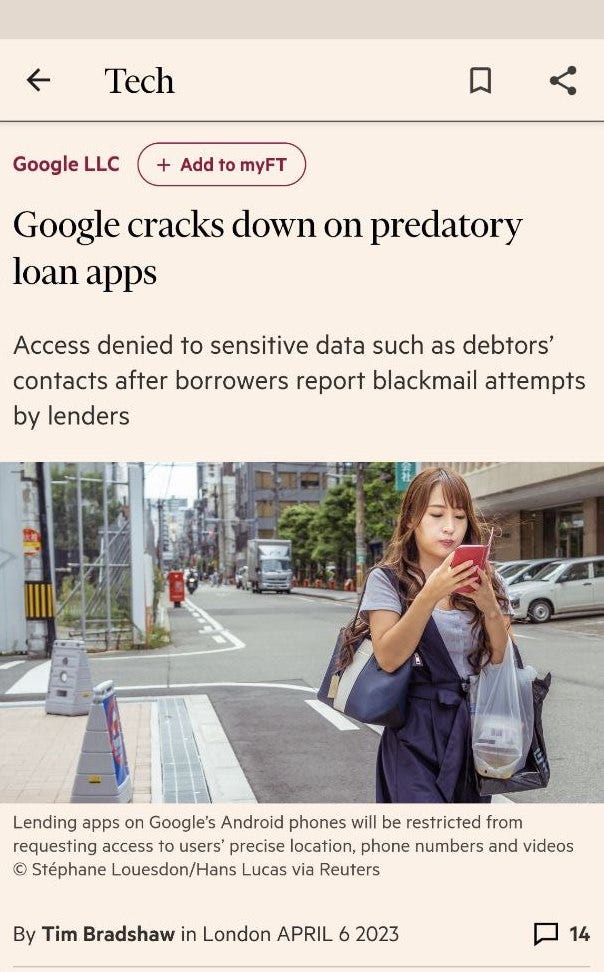One of the stated goals of Alphabet (Google’s mummy & daddy) is “Empowering great entrepreneurs and companies to flourish.” There is a real risk that it’s latest policy on' ‘lending apps’ puts fintech startups at a disadvantage to the benefit of BigBank.
Many will accuse me of speaking to my book as a co-founder of Carbon, a pan-African digital bank, and its a justified accusation. But even bringing this up is not an easy act. I write this article with all sense of responsibility and humility as Nigerian politicians would say. In fact I am actually writing this on my knees, begging in advance in case I cause any offence.
Google is Carbon’s primary source of customer acquisition so anything they say, we will do immediately. But like the African proverb goes:
“Just because the lizard nods his head, doesn’t mean (s)he’s in agreement”
So Google, Ngozi the Agama lizard1 is nodding his head at your latest policy; but he is not in agreement.
But Ngozi, this is unlike you, why such heat? Especially for a company that is renowned for its “Don’t be evil” maxim.
A well intentioned policy
Well recently Google announced a new policy for financial services apps prohibiting access to contacts and photos from the 31st of May. No major surprises as Google has been progressively restricting access to personal data on the phone - along with Apple. Certainly in some emerging markets including Nigeria, I suspect the abuse of this data by many lending apps acted as a main driver. It works like this:
Customer downloads lending app to borrow money; a precondition for the loan is providing access to their contacts and photos. If customer defaults on loan then to shame the customer to repay, the lender sends some or all the contacts of the borrower with a message like this:
Clearly this practice is abusive and goes against all privacy laws; Google is right to reduce the invasion of privacy. But in implementing this policy with not enough nuance, Google is cutting the legs off from some of the more innovative companies who are doing the Lord’s work. Like erm Carbon.
Now of course there are others like us in Nigeria but I don’t want to mention their names - I can’t advertise for them and their founders should go and write their own blog 😀. But by lumping us and others in the same camp as ‘predatory loan apps’ it kills the trust that we have spent some time building amongst our customer base.
It is unclear to me how the Carbon app is different from CashApp, Chase’s digital banking or MPesa. We all do the same thing; give customers a safe place to keep funds, make payments, generate interest and borrow funds.
Why the different treatments? The distinction between lending apps and digital banking apps is disingenuous; a bank, which Carbon is, by default lends. Therefore all banking apps are by default lending apps (broadly speaking).
As an example this action by Google has caused the Financial Times, an institution I revere (and even pay $69 subscription a month - at >N750 to 1) to call Carbon a predatory loan app. And this was just before Easter o. Jesus please take the wheel for your child knows not what to do.
There is a grave danger that what started as a positive action will stifle innovation and hurt the smaller companies that are doing God’s work in financial inclusion. What’s worse is that there is already an uneven playing field between the fintech Davids and the BigBank Goliaths.
For when you spend a large amount on Google advertising, you get an account officer in Google to facilitate all your needs. Its inevitable that the more you spend, the greater access you will have. A Cash app or MPesa will inevitable have ways of pleading their case; especially if they are spending millions of $ in advertising across various Google channels. I will not be surpirsed if they are not affected by this new policy.
Be wary of good intentions
I expect a lot of angst as fintechs try to comply with this new directive by the end of May. Engineers, say goodbye to sleep because failure to comply will probably result in your app taken off the app store and this is catastrophic when the Playstore is your only distribution channel. And unfortunately when you eventually get back on the Store, you will be penalized in term of the cost of acquiring customers because’s Google’s algorithm will have to start relearning your app’s patterns!!!
I laugh in ChatGPT.
Are you telling me that Google’s marketing algorithm doesn’t keep notes? Have always found this fishy especially in the age of AI and machine learning.
A lot of complaints Ngozi but no solutions - what would you do then? Easy.
Distinguish between regulated entities and non-regulated. Its crazy to me that apps that are regulated by in our case a Central Bank are being treated more flexibility with regulated entities that have much higher operating requirements. In Nigeria as an example, there are less than 1,000 regulated financial services of which just 173 have registered with the consumer protection agency. Probably not all will be affected but those that are regulated by the Central Bank AND the consumer protection entity of their countries should be given more flexibility
Take a considered approach to kicking people off the apps store. Google makes mistakes but it doesn’t apologise. If you like leave, if you like stay. I know a case of a Nigerian app that was suspended because they “did not have the regulatory approvals for lending in Indonesia or India” which in theory was true because the company had no operations in either of these countries. Google made a mistake and delayed listing of the app - but when you are the only game in town, one just takes the L and moves on. Not everyone can survive this kind of violence and so it would be good if the big G erred on the side of caution.
On Responsibility
Taking a step back though, there is a bigger issue and that is the increasing dependence on startups like Google & Apple as aggregators of customers. This is an issue that has been rightly highlighted by politicians in Europe and the United States.
Google is going to make decisions that optimise for its largest markets thus the attention of the vast majority of its staff and consequently policies will be on these markets. Startups in non-core emerging markets have a heightened risk of over-dependence on this channel especially when policies may be detrimental to their growth. There is an urgent (albeit difficult) requirement to build resilience along three vectors
customer acquisition - if app stores are the only way you get customers, what happens when your gatekeepers says your apps falls foul of its existing policies
marketing: paid acquisition can be like addiction - you need to keep spending to maintain a level of engagement. If you reduce your spending, the algorithm forgets and has to start building from scratch.
monetisation: Google’s revenue share for in-app purchases at 15% is significantly less than Apple but if your cost increases over time it is difficult to negoiate with the Big G so diversifying your revenue streams is critical. This is less of an issue for most fintechs but still one to be wary of.
You know when your father is flogging you and you stop begging in English and start speaking in tongues; I think that’s where I am now. Not sure I will make much more sense so let me stop here. Will try and refine essay if I haven’t been kicked off all google apps. But if they are reading this they should know I am loyal - i was even a member of Google+ till the bitter end. Please be gentle.





